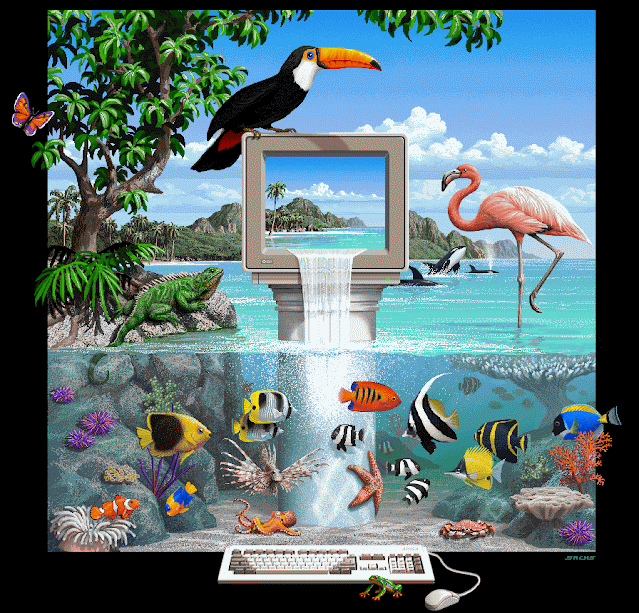Eight Rock Star Programmers You Never Heard Of Part 2

When last you weren't reading Part 1 of this article, I was going on about programmers as musicians, and attempting to write clever analogies. I make no pretense of doing that again.
Jeff Minter
Rock Star Status: Captain Beefheart
No, he isn't. He's Jimi Hendrix. I don't know enough about Captain Beefheart, anyway. But Jeffy is like, wow. He paints in big, bright, bold lo-res graphics, EXACTLY like if Hendrix was writing a song using an 8-Bit device. About Llamas. And that's just his early, blues-based stuff. His games are like records you can just put on repeat.
Possibly after bonging out.
It is 3D in which Mr. Minter really hits his stride. His broad strokes from a carefully chosen palette give way, mid-career, to concise swirls of notes, buzzing around your head out of the ether in a most cosmic-like manner. "Minter is God" read the buttons of the affected. Pure psychedelia in digital form.
Eat Electric Death indeed, man.
But Jeffy is more than virtuoso. He spearheaded an actual, if failed, revolution. One of his designs was slated to be the pack-in game for a system Nintendo was working on, named Revolution. This was obviously way too much for The Man, as the game wasn't included, and the system name was watered down to the non-revolutionary Wii.
Pic Possibly Unrelated.
Jim Sachs

In an eerie reversal of Dorian Grey, Jim's self-portrait stays the same as he gets older. But I kid.
Look, Jim did a lot of stuff, but let's be honest, here. Defender of the Crown will always be his crown jewel, his "Morning Has Broken"
He influenced George R.R. Martin.
Dang, that is kinda sad, actually. He's on Facebook, really, so no worries. Although one wonders what his artwork would be like if he had instead embraced Islam...
The next, eagerly-awaited Cat Stevens album from Jim was slated to be the eagerly-awaited 20,000 Leagues Under The Sea game. Drawn with the same loving attention to harmony and melody as one assumes Cat Stevens once did, the gaming public drooled at the prospect. I think we did it all using our imagination, as that's all we had to go off of. 20,000 Leagues. Jim Sachs. Defender of the Crown.
See that animation? That's what I'm talkin' bout.
Here's where it gets sad, and actually almost sort of parallels the life of Cat Stevens. It seems our Mr. Sachs worked so hard on this game, 20 hours a day, people say, that he eventually had to pull off of the project. The world is sadder for the loss.
Don't get too sad, though. We still get great things like his artwork.
And his very realistic aquarium screen savers.
In a sense, it's almost like Jim never left the idyllic aquatic environment of 20,000 Leagues Under The Sea, instead electing to remain there forever, in a world without deadlines or silly sleep requirements.
Dang, that is kinda sad, actually. He's on Facebook, really, so no worries. Although one wonders what his artwork would be like if he had instead embraced Islam...
Team Amiga
The Amiga people were more like The Beatles, but they looked and acted like the Monkees. By all accounts, it was like watching Sargent Pepper being recorded with Wacky Sax playing on a continuous loop. This was a famous misdirection straight out of 'The Art of War'.
Amiga were making a computer. Well, they were making a game system, ostensibly. But they didn't want anyone to know any of that. So they released games, joysticks, and peripherals. In fact, they released the original Wii Balance Board, the Joyboard.
But check this out: In 1984, the Macintosh debuted. Black and white, mono sound, one-button mouse, single-tasking. The Amiga came out in 1985, with 4096 colors (kinda), 16-bit stereo sound, a two or three-button mouse, and multi-tasking. It's been the model for computers ever since. Also somewhat obscure and European. Like Ozric Tentacles, I guess.
It's not like they stopped with one, either.
The Amiga's real power was in its operating system. Intuition, the backbone of Workbench, had mystical properties. It could read minds. Consequently, other Amiga users were your tribe, sight unseen. We were all hanging out a big muddy rave together. Somewhere in Europe.
There were way too many people involved to start naming them by names. Kinda like...Ozric Tentacles? But as if creating the most iconic computer of all time wasn't enough, a few Amiga people released some solo albums as follow-ups.
Okay, perhaps I should stop picking bands I know little to nothing about. I have no good way to tie the Amiga people to Ozric Tentacles, short of using some cliched way to say they created digital/analog alchemy on a grand scale.
Nailed it.
Rock Star Status: Ozric Tentacles
Joel on Software Joel
Joel Spolsky? Rock star?
Hell yes. Although he'd probably cringe at the comparison, and we imagine he shuns rock star programmers in general. perhaps that's because rock star types don't always get on well with other rock star types.
And Joel is about as big as it gets, in a sense. He was project manager (or some such lofty title - I don't really research these things) on an obscure little project that may have passed across your desk once or twice in your life.
That's right. He wrote Microsoft.
But Joel didn't just rest on his laurels. Oh, hell no. He's now one of the top columnists on Silicon Valley topics. His articles on usability are like User Interface Design erotica. He builds teams and projects in a decidedly non-Microsoft fashion. Not content to rehash major label pop forever, he continues to refine his art, on his own terms.
Joel rocks. But he rocks in a timely manner, on budget, and meeting the targeted specifications.
Rock Star Status: Tin Machine-era David Bowie.






























Comments
Post a Comment